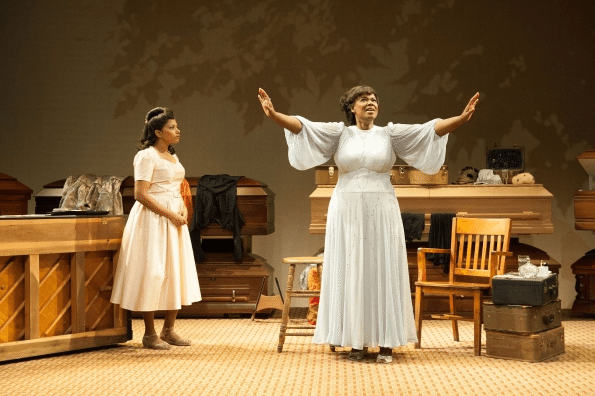

The two women are dressed in white, the older one sits still, as the younger one stands close to her and begins applying makeup on her face. They are surrounded by coffins that fill the air with a pervasive eeriness, and yet the two women can’t help but bring what can only be described as serene earthiness. They ground the chaos around them, and all of this happens before they even open their mouths. We learn that the seated woman is Sister Rosetta Tharpe (Kecia Lewis), an outspoken gospel singer who has earned the disdain of many a churchgoer for praying with her hips more than with her hands. The younger woman is Marie Knight (Rebecca Naomi Jones), a more conservative singer, plucked from a chorus the night before by Sister Rosetta who saw potential greatness in her.
George Brant’s Marie and Rosetta imagines the duo’s first night of rehearsal together as they try to find a common ground that will allow them to show their devotion without betraying themselves and offending the other. The play goes for a traditional structure as Sister Rosetta pretty much tells her life’s story during their conversation, but the writing is so finely tuned that whenever she speaks in a “theatrical” way, we assume it’s also one of her diva behaviours.
Their conversations are rich with details that establish their inner lives (there is recurrent talk about Sister Rosetta’s rivalry with Mahalia Jackson) and also give us a context of the trying times these women lived in, turns out the funeral home setting isn’t only meant to be a memento mori, but the only place were two black women could find lodging in the American south in 1946. Sister Rosetta speaks about how peacefully she’ll sleep in her favorite coffin model, but one can guess audience members might not have equally sweet dreams aware of the horrors that black people endured, and continue to encounter in the US.
Without relying on extreme didacticism, director Neil Pepe crafts a work that’s equally entertaining as it is enlightening, it’s a play that invites us to see past what we know and look into cultural appropriation, Sister Rosetta was one of Elvis’ biggest influences but which of the two do we still talk about? Filled with glorious musical numbers - the show pulses with life as the women sing - Marie and Rosetta is unafraid to find reasons to praise in a world filled with injustice, it grants us the kindness time didn’t allow its protagonists.